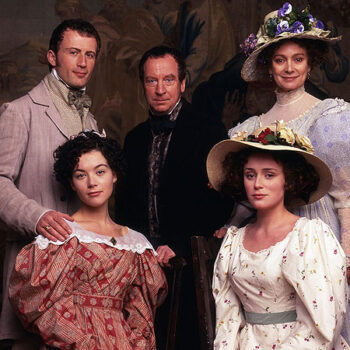Despite my love of classic novels, I have barely read any English novels from the Victorian era so I have decided to remedy this by reading one or two Victorian novels a year (hopefully this post will be the first in a series of many). This resolution came about because I realized (and was confirmed by a quick wikipedia search) that the novel hasn’t always been the leading form of literature, and that it is probably thanks to the multitude of great Victorian novelists that it is the current leading form of literature.
Elizabeth Gaskell is one of the most well-known female Victorian novelists whose works are still widely read today. North and South is one of those books that’s been in my TBR forever but I just never seem to get around to it. Out of all of Gaskell’s books, Wives and Daughters was the one that appealed to me the most so this is the book I chose to read from her.
The first chapters of the book introduces us to our heroine Molly Gibson who is the daughter of the town’s highly respected doctor, Dr. Gibson. Her father Dr. Gibson came to town as partner to the town doctor who was getting too old to manage all the patients and proceeded to marry the old doctor’s grandniece. Molly’s mother died of consumption when she was three years old so for many years it has just been her and her father until her father remarries another widower (Mrs. Kirkpatrick) who has a beautiful and elegant daughter Cynthia. Molly dislikes her narcissistic and vain stepmother but forges an instant bond with Cynthia. Molly’s love for Cynthia will be an important plot point throughout the latter half of the novel as it drives some of the big plot developments of the book.
Like all good English novels, there is a large cast of characters. Some are harmless gossips, some are not so harmless and some are genuinely likable. I particularly liked the Miss Brownings, the Hamleys and Lady Harriet (who is super cool).

Having grown up in a non-traditional household myself, I found myself relating a bit too much to Molly’s experiences and conflicting feelings surrounding her new stepmother and stepsister so this book gets plus points just for that. Gaskell’s writing style is enjoyable and while you can definitely tell it’s Victorian from the telltale general wordiness but doesn’t require nearly as much mental gymnastics as George Eliot’s writing style. Out of all the Victorian writers I’ve read, I think Gaskell’s style is probably most similar to Anthony Trollope’s.
While the book’s premise seems simple enough, it actually covers quite a broad dense of topics and I particularly enjoyed Gaskell’s depiction of country life along with the intricacies of the dynamics between different socioeconomic classes. There are only two faults that I can find with this novel – some racism (mostly regarding Roger’s scientific travels in Africa that might not have been Gaskell’s own view rather a reflection of British views at the time) and the fact that it is UNFINISHED. Gaskell died before writing and publishing the last installment of the novel and it is such a shame. However it’s not so bad, because there is an afterword explaining how Gaskell intended to conclude the novel. I have also heard that the 1999 BBC miniseries has a more “complete” ending to the novel so I will be checking that out! BBC miniseries are usually great and I’ll edit this post with my thoughts once I’ve seen that.
